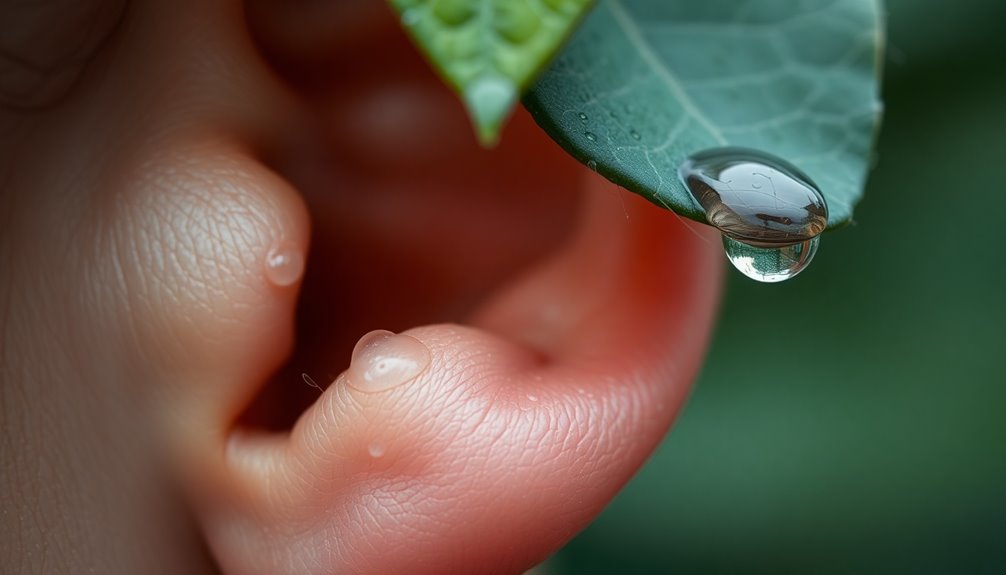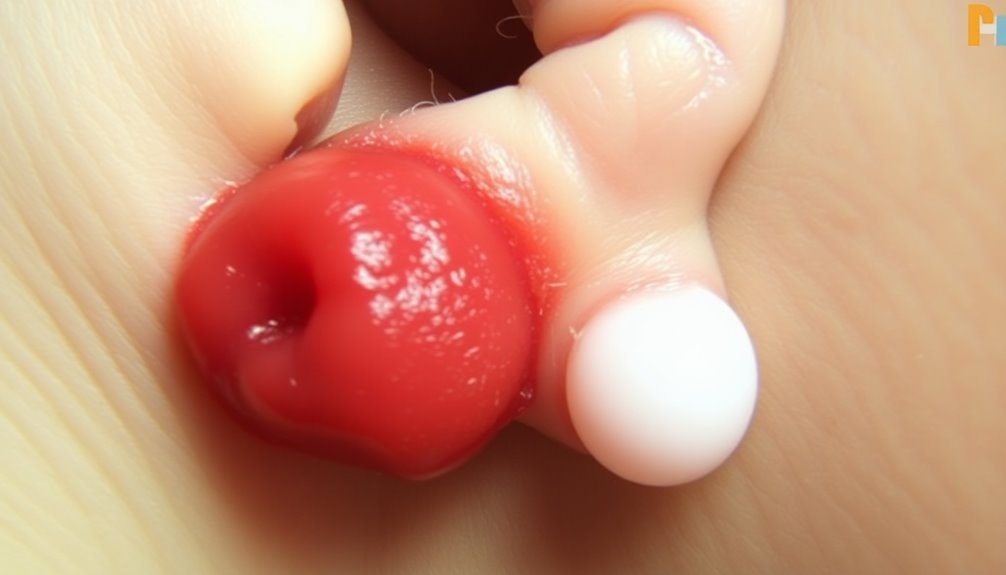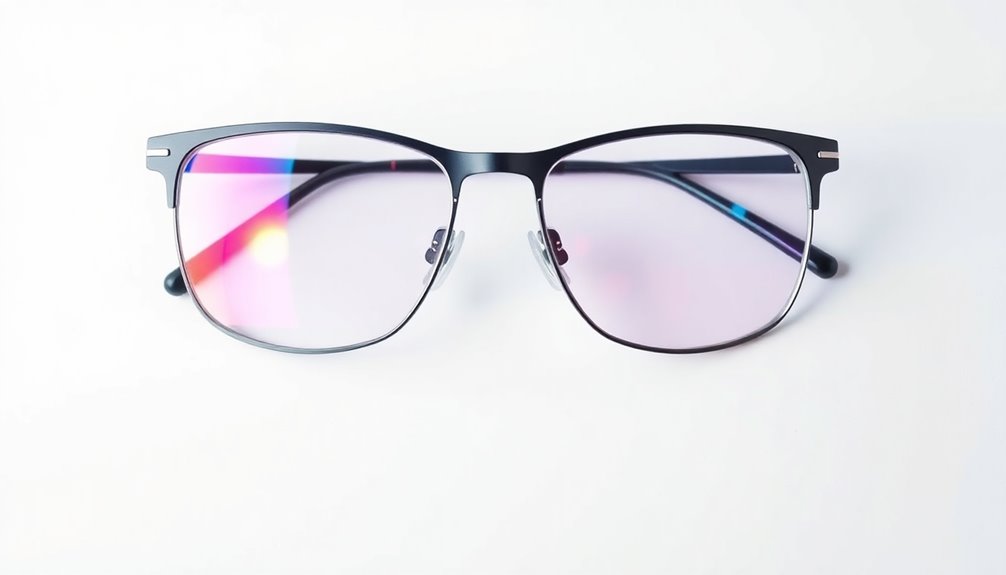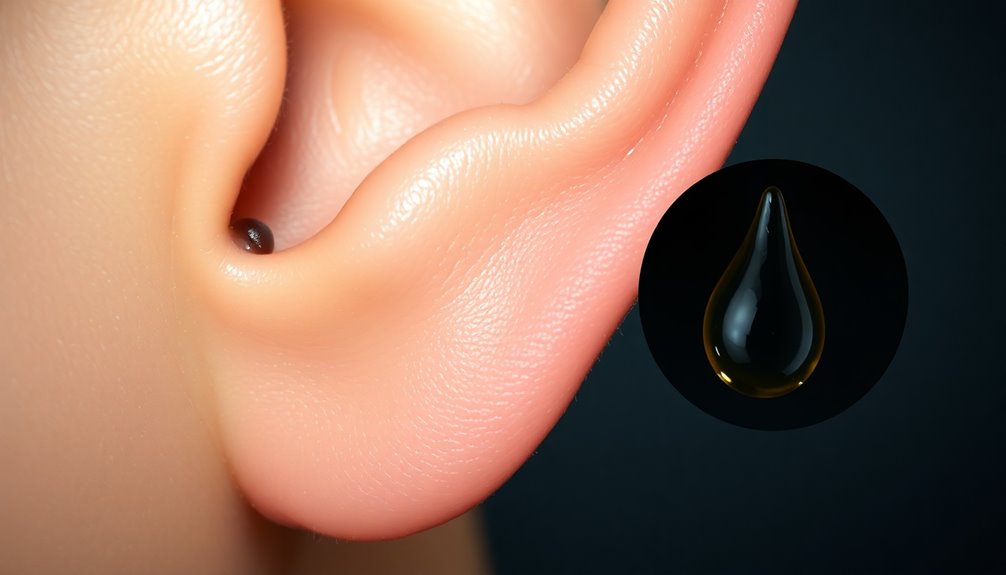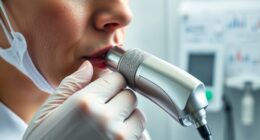Your ears might feel wet because of earwax buildup trapping moisture, which creates that annoying damp sensation. This is pretty common, especially if you've been swimming or bathing, as water can get stuck in your ear canals. Excessive earwax can lead to feelings of fullness and discomfort, making it seem like there's always moisture present. While ears generally self-clean, it's important not to use cotton swabs, as they can push wax deeper. If this wet feeling persists, it could signal a deeper issue, and there's more to discover about managing this condition effectively.
Key Takeaways
- A wet sensation in the ears often results from earwax buildup trapping moisture, leading to feelings of fullness or dampness.
- Excessive earwax can occur due to factors like trauma, skin conditions, or frequent use of earplugs.
- Swimming or bathing can introduce water into the ear canals, contributing to a wet feeling.
- Impaction of earwax can cause blockages and discomfort, necessitating safe cleaning methods or professional help.
- Regular ear cleaning is usually unnecessary; ears are self-cleaning unless experiencing persistent discomfort or hearing loss.
Understanding Earwax Production
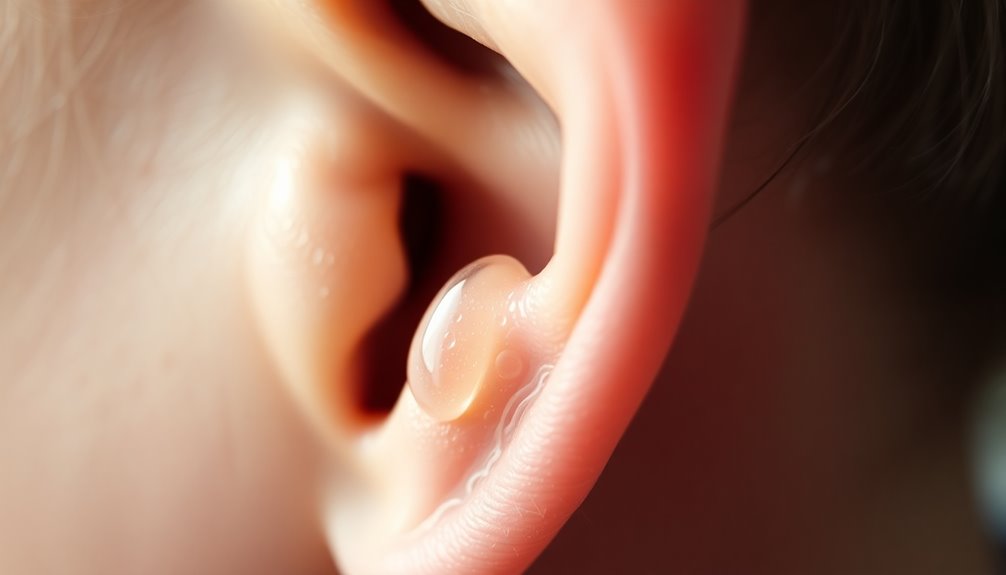
Earwax, a natural substance found in your ears, plays an essential role in protecting your ear canal. Produced by sebaceous and ceruminous glands, earwax, or cerumen, serves as a barrier against dirt and infections, helping maintain your ear health.
Its composition includes sebum, dead skin cells, and antimicrobial proteins that moisturize your ear canal and trap debris.
You might notice that earwax production varies between individuals, influenced by genetics. For example, wet earwax is common among people of European and African descent, while dry earwax is more prevalent in East Asian populations.
Natural movements, like chewing and talking, assist in expelling earwax from your ear canal, keeping it clean and reducing buildup.
However, excessive earwax production can occur due to various factors, such as trauma, skin conditions, or frequent use of earplugs and earbuds, which may push wax deeper into the canal.
Understanding these aspects of earwax production can help you appreciate its protective role and recognize when you might need to address issues related to ear health.
Causes of Wet Sensation

A wet sensation in your ears often stems from the natural buildup of earwax, which can trap moisture within the ear canal. When you produce excessive earwax, it can lead to a feeling of fullness and dampness. This excess might occur due to various factors, such as trauma, skin conditions, or frequent use of earplugs and earbuds.
If earwax becomes impacted, it can create blockages in the ear canals, resulting in discomfort and that persistent wet feeling. Activities like swimming or bathing can also introduce water into your ear canals, temporarily contributing to this sensation.
Additionally, an imbalance in earwax production—whether too much or too little—can disrupt your ears' natural cleaning process, leading to irritation or a damp sensation. Consulting a veterinarian can provide insights on managing conditions that may contribute to earwax buildup.
Understanding these causes is essential, as they can inform you about the best approaches to manage the wet feeling in your ears. By recognizing the role of earwax buildup and the potential impact of impacted earwax, you can take steps to address this discomfort effectively.
Safe Ear Cleaning Methods
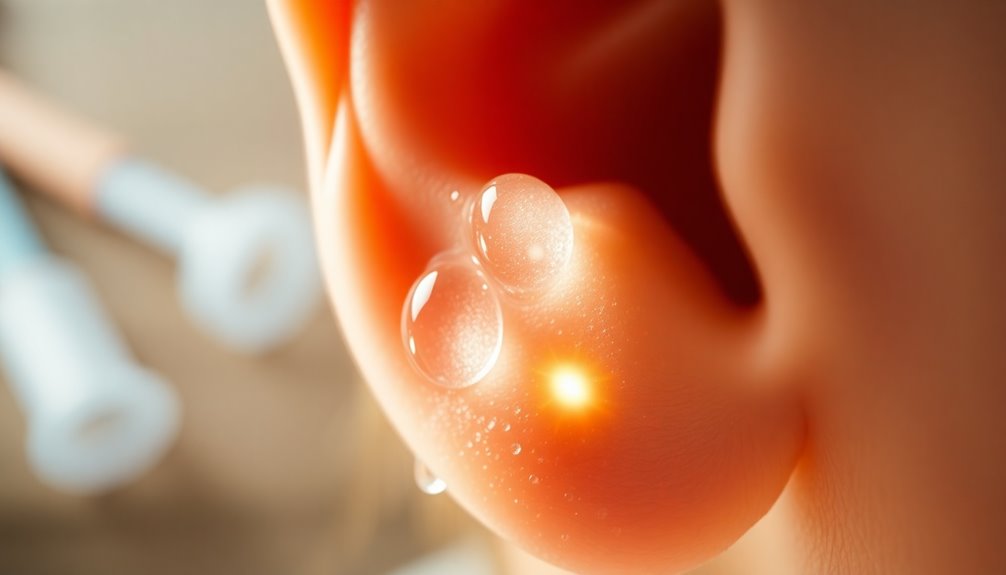
Cleaning your ears safely is important to prevent discomfort and potential damage. Your ears are mostly self-cleaning, and regular cleaning isn't usually necessary. In fact, using cotton swabs can push earwax deeper, leading to impaction or even injury.
To remove earwax safely, consider using over-the-counter earwax-softening drops, like those containing carbamide peroxide. These can help manage excess earwax without risking harm.
For hygiene, gently clean the outer part of your ears with soap and water. Avoid inserting anything into the ear canal unless a healthcare professional advises it.
If you're experiencing symptoms like hearing loss or discomfort, it's best to consult an audiologist or healthcare provider. They can guide you on safe ways to remove earwax and address any underlying issues.
Always prioritize safety when it comes to ear cleaning. By adopting these practices, you can maintain your ear health while preventing common problems associated with improper cleaning methods.
When to See a Doctor
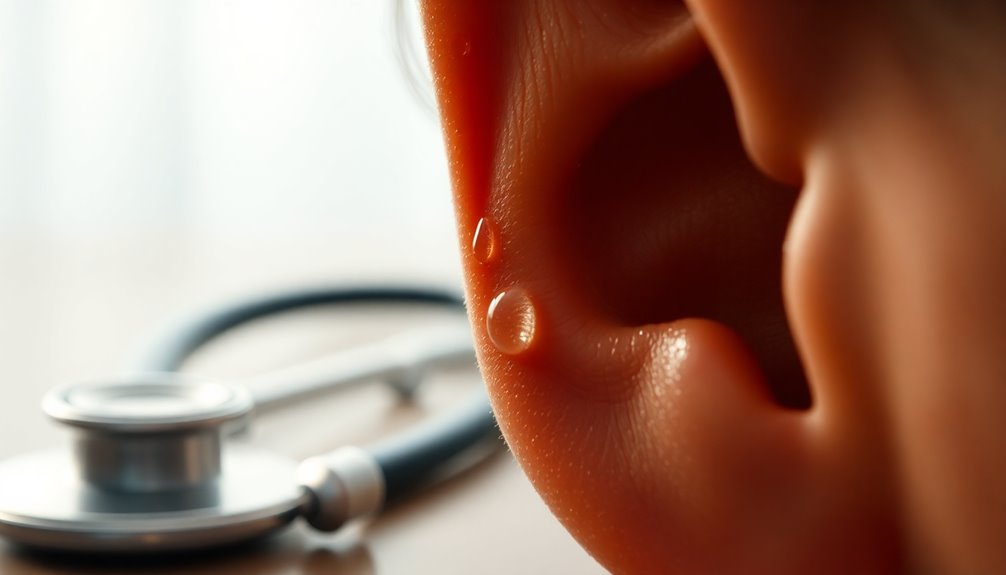
If you notice a persistent wet sensation in your ears, it might signal a deeper issue, especially if accompanied by pain, drainage, or hearing loss. It's essential to consult a healthcare professional to rule out any underlying concerns. Symptoms like fullness in your ear, dizziness, or a foul odor can indicate earwax impaction or an infection, both of which require medical attention.
Here's a quick guide to help you decide when to seek help:
| Symptoms | Action |
|---|---|
| Persistent wet sensation | Consult a healthcare professional |
| Pain or discomfort | Seek medical advice |
| Noticeable earwax buildup | Visit an audiologist for guidance |
| Self-care methods aren't working | Consult a healthcare provider |
Regular check-ups can keep your ear health in check, especially if you're prone to excessive earwax buildup. If you use hearing aids and notice more earwax than usual, it's best to consult a healthcare professional to confirm everything's functioning correctly. Don't ignore these signs; addressing them early can prevent further complications.
Myths About Ear Care
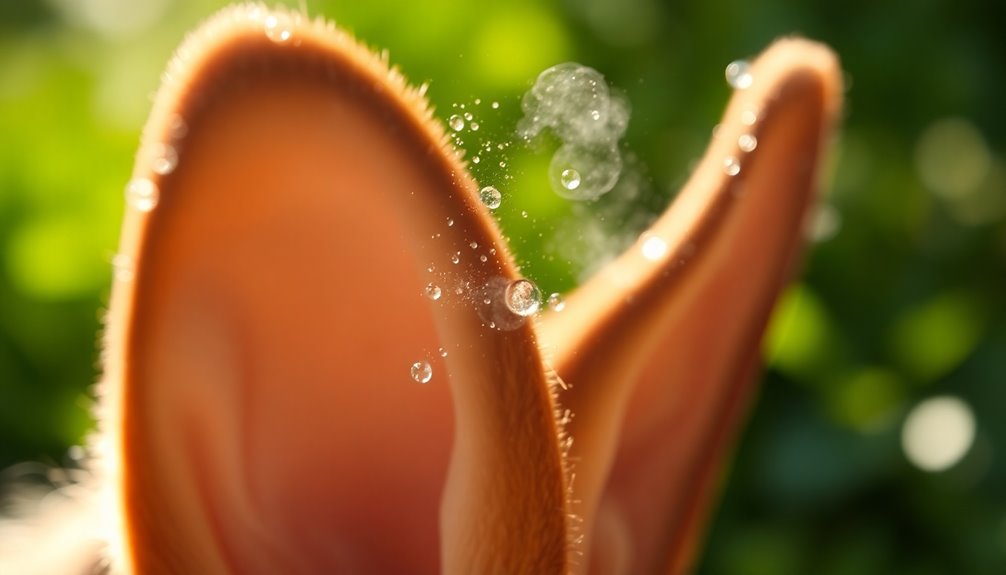
Many people hold misconceptions about ear care that can lead to ineffective practices and even harm. One common myth is that earwax is dirty; in reality, it plays an essential role in protecting your ears and maintaining overall ear health. It traps dirt and helps prevent infections.
You might think using cotton swabs is an effective way to clean your ears, but this can actually push earwax deeper, increasing the risk of impaction or injury.
Another misconception is that excessive earwax indicates poor hygiene. This isn't true; it can be a natural response to certain conditions or the use of hearing aids. You probably don't need to actively clean your ears, as the ear's self-cleaning mechanism usually suffices.
Many believe they should regularly engage in ear cleaning, but this isn't necessary for most people.
Lastly, ear candling is often touted as a remedy for earwax buildup, but it's ineffective and can pose serious risks, including burns and blockages. Understanding these myths can help you take better care of your ears and avoid harmful practices.
Frequently Asked Questions
Why Do My Ears Always Feel Wet?
If your ears always feel wet, it might be due to the normal production of earwax, which can trap moisture and debris.
Sometimes, excessive earwax buildup creates a feeling of fullness or dampness.
If you use hearing aids, they might contribute to increased earwax accumulation.
Environmental factors, like humidity or water exposure, can also play a role.
If you experience pain or hearing loss, it's best to consult a healthcare professional.
Why Does My Ear Constantly Feel Like It Has Water in It?
You know that annoying feeling when you think you've got water stuck in your ear?
It might just be excess earwax or natural moisture. If you've been using earplugs or earbuds, they could be pushing wax deeper, making things worse.
Allergies or sinus issues might also contribute to that sensation.
If it's persistent or painful, don't hesitate to reach out to a healthcare professional. Your ears deserve some peace!
What Is Wet Ear Syndrome?
Wet ear syndrome refers to a sensation of moisture in your ears, often caused by excessive earwax buildup.
When your ear canals are narrow or if you have skin conditions, it can hinder the natural expulsion of wax. This accumulation can lead to symptoms like fullness, discomfort, and even hearing loss.
If you're experiencing persistent issues, it's best to consult a healthcare provider for appropriate treatment options.
How to Get Rid of Fluid Feeling in Ears?
To get rid of that fluid feeling in your ears, start by using over-the-counter earwax-softening drops.
They'll help break down any buildup. You can also gently rinse your outer ear with warm water while showering to loosen any wax.
Avoid using cotton swabs, as they can push wax deeper.
If the sensation continues, it's best to consult a healthcare provider for a professional evaluation and safe removal of any impacted earwax.
Conclusion
To summarize, if your ears always feel wet, don't panic! Understanding earwax production and recognizing the causes can help you manage that pesky sensation. Remember, your ears are like a well-tuned orchestra; they need the right care to perform beautifully. Stick to safe cleaning methods, and don't hesitate to consult a doctor if something feels off. By debunking myths and staying informed, you can keep your ears happy and healthy!
